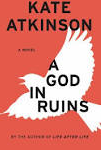 There are novels that readers describe as thrillers, novels whose plots are complex but clear, novels of manners, and novels that grab the reader’s attention because they are so emotionally compelling. Kate Atkinson’s latest novel, “A God in Ruins,” is all of these. Ted Todd is an RAF pilot during the Second World War; he’s based in the northeast of England, and flies many bombing runs during the Allies’ strategic bombing campaign against Germany. Before the war he was a banker like his father Hugh, though, unlike his father, Teddy was not happy in that career. After the war Teddy comes home and marries Nancy Shawcross, the girl next door. He and Nancy both teach, and while Nancy is a success, Teddy is not, and he becomes a journalist, writing a column for, then becoming a reporter for, and finally running, a local newspaper.
There are novels that readers describe as thrillers, novels whose plots are complex but clear, novels of manners, and novels that grab the reader’s attention because they are so emotionally compelling. Kate Atkinson’s latest novel, “A God in Ruins,” is all of these. Ted Todd is an RAF pilot during the Second World War; he’s based in the northeast of England, and flies many bombing runs during the Allies’ strategic bombing campaign against Germany. Before the war he was a banker like his father Hugh, though, unlike his father, Teddy was not happy in that career. After the war Teddy comes home and marries Nancy Shawcross, the girl next door. He and Nancy both teach, and while Nancy is a success, Teddy is not, and he becomes a journalist, writing a column for, then becoming a reporter for, and finally running, a local newspaper.
This work leaves him a great deal of time to spend with their daughter Viola, who grows into an angry and somewhat self-destructive adult. In her twenties (by now we’re in the mid-1970s) she moves into a London squat with her partner and Sunny (a boy), their first child. They move on to a countryside cult where Viola has her second child, Bertie (a girl). When Viola has to run she brings the children home to Teddy. Bertie and Sunny adore him and, yes, we learn why Viola does not.
If these characters sound familiar, they should, because many of them appear in Atkinson’s previous novel, “Life After Life” (you can read my review of that novel here). “Life After Life” focused on Teddy’s adored older sister Ursula, and her experience during the war. Teddy and Ursula have two other siblings, Pamela, who makes a brief appearance here, and the pompous Maurice, who mostly stays offstage. Each novel stands on its own (in an afterward, Atkinson writes that she thinks of “A God in Ruins” as a companion to “Life After Life,” not a sequel). Nevertheless, the experience of reading each is deeper and more resonant for readers who read the other. (If you haven’t read “Life After Life” the order probably doesn’t matter but please weigh in on this question in the comments, especially if you disagree.)
Family life, sorrow, a good mind, pain–these are the plants that grow in Teddy’s garden. But it’s the substrate of the war that provides the soil, and Teddy’s experiences as a Halifax pilot are at the center of the novel. Atkinson’s text is vivid and lively; she slowly increases the tension as she describes the life of a bomber crew before, after, and especially during the slow and dangerous progress of a bomb run. Her meticulous descriptions are based on memoirs, and include details as small as the crew’s good luck charms and routines, and as large as the moral questions that followed from the decision to bomb German industrial centers and worker housing. The bombing may have been intended to avoid the need for the useless trench warfare of the Great War, and the Germans continued to bomb population centers like London, but neither of those is an adequate justification for Atkinson. For Teddy, the bombing campaign became a war of attrition, and the war became the central experience of his life. When he thinks about it, he concludes that the best and possibly only thing he can do to atone is to be kind. That’s not enough for Viola.
In “Life After Life” Atkinson trusted her readers to follow her through different permutations of a story, as she explored the ramifications of chances taken or passed by, and let consequences play out. “A God in Ruins” explores one of the roads not taken by the Todd family (or written there by Atkinson) and Atkinson provides signposts as she follows Teddy’s family through the decades succeeding the war. The ending is unexpected, heartbreaking (one friend described herself as “gobsmacked”) and breathtaking.
Read “A God in Ruins” but take it with you on a plane, or a vacation, or save it for a long weekend. You may not be able to stop reading it once you’ve started.
Happy Holidays! I’ll see you in the new year. In the meantime, have a book you want me to know about? Email me at asbowie.blogspot.com. Follow me on Twitter @abowie917.
This post has been updated to include a missing link.


